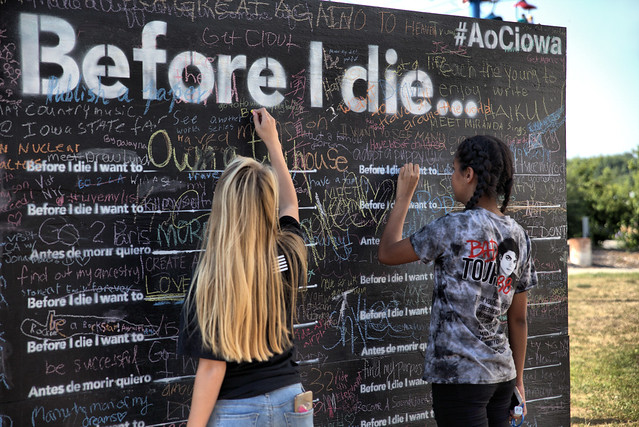When people ask what I do, I am reluctant to say I am a hospice chaplain. My reluctance is not because of the work I do, rather it is because of the reaction I get from people who make assumptions about my work. “Doesn’t it make you sad to sit with people who are dying all day?” Or, “I could never do that; you are such a saint.”
These reactions show how far removed we are as a society from death. And sadly, the church is not involved in dying either. The only time I remember hearing about dying growing up was on Good Friday when everyone was in a hurry to move on to Easter Sunday. We love the resurrection and a happy ending but don’t want to talk about death and dying. The Psalmist reminds how short our time on earth is- “Lord, let me know my end, and what is the measure of my days; let me know how fleeting my life is.” (Psalm 39:4)
We are all going to die, yet for many of us, it is easy to push that thought to the back of our heads and rarely think about it. For those who have been told they are dying or who are advancing in age, it becomes much more difficult to dismiss or ignore their own impending death. I have been with deeply religious people, people who claim no faith, people who are spiritual and not religious, people who believe that death is the end, and people who are eagerly awaiting the afterlife. Almost every one of them had questions about dying and death as the time got closer. We all do.
Why do we not preach more often about the end of life (outside of funerals)? Those of us who do not know that our end is near share a lot in common with those whose imminent end is more certain. We all search for purpose and meaning in our lives. We want to leave a legacy, although that looks differently for all of us: children or grandchildren, relationships, kindness shared with others, work contributions, or changes made to our community.
Hospice is about living well every day you have been given. In my work, I help people think about what has brought meaning to their lives. We discuss doing what they can to complete their to-do or bucket lists. Now is the time for all of us to do this work because “When their breath departs, they return to the earth; on that very day their plans perish” (Psalm 146:4). I listen as they share memories and stories that make them who they are and help people reconnect with loved ones as Jacob requested to do with his son, Joseph (Genesis 45:28-“I must go and see him before I die”).
One of the gifts of the church is that it is a place where people of all ages gather together. As older people (and sometimes young people) die, the church can talk about death. As people choose to be on hospice services, the church, and even preachers can educate on what hospice does and how it helps the person and their family and friends prepare for death and grieve those who have died. Instead of only talking about death once a year on Good Friday, the church has the opportunity to have regular conversations about death and dying, so it is not so scary for anyone.
Addressing dying and death from the pulpit is necessary and needs to be done well. Do not use clichés like “they are/will be in a better place” or “heaven needed another angel” as most grieving people agree that these phrases are more hurtful than helpful. Do not refer to stopping treatments or entering hospice as “giving up”; instead, emphasize how we can support the person who has made a difficult decision to live well and let them know that their church will continue to be with them. Remind people of Romans 14:1-12: “Whether we live or die, we are the Lord’s” (Ordinary 24A). This Scripture is a reminder that our whole existence is in God’s hands and there is nothing to fear.
When these readings come around in the lectionary, consider preaching on how we face the end of our lives:
• Psalm 46 (Easter Vigil ABC, Ordinary 9A, Christ the King C) God is always with us no matter what is happening in our lives. This Scripture would work well for talking about what a person goes through when they receive a diagnosis, seek or do not seek treatment, choose palliative or hospice care. There may even be someone in your congregation willing to talk about how their faith helped them make these important decisions and how their church family can support them.
• Romans 8:26-39 (Ordinary 17A) The Spirit will pray for you when it is too hard to pray; nothing at all separates us from God. This is a comfort for the dying and those whose loved ones are dying.
• 1 Corinthians 15:51-58 (Epiphany 8C) We do not need to fear death nor that our life has been in vain, because of our faith in Jesus Christ.

